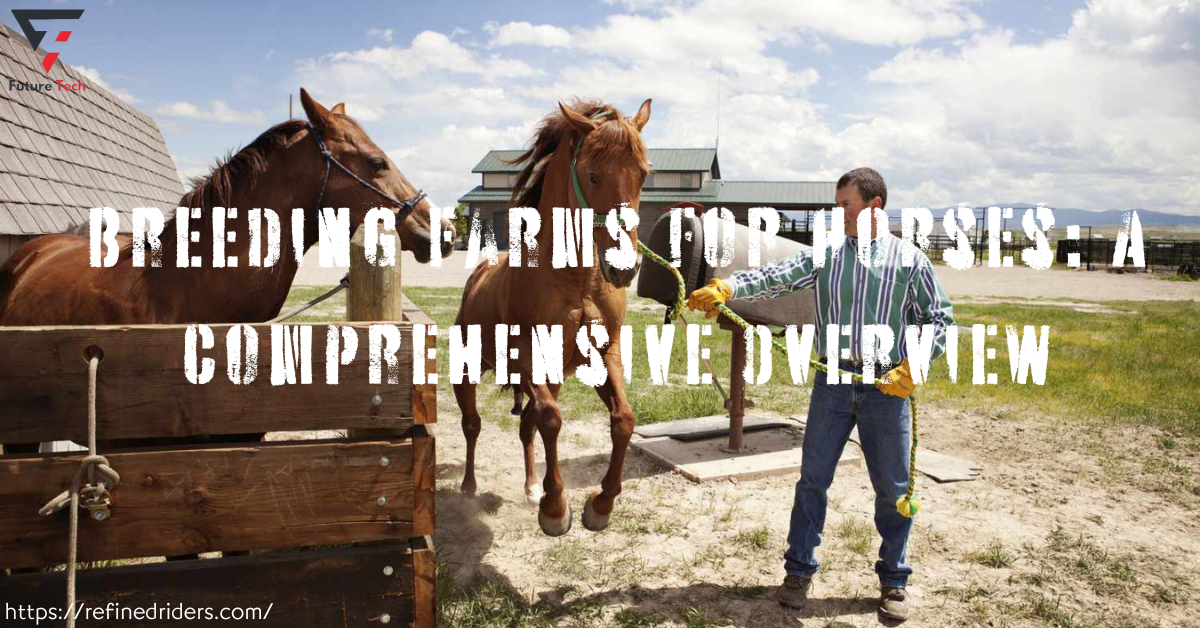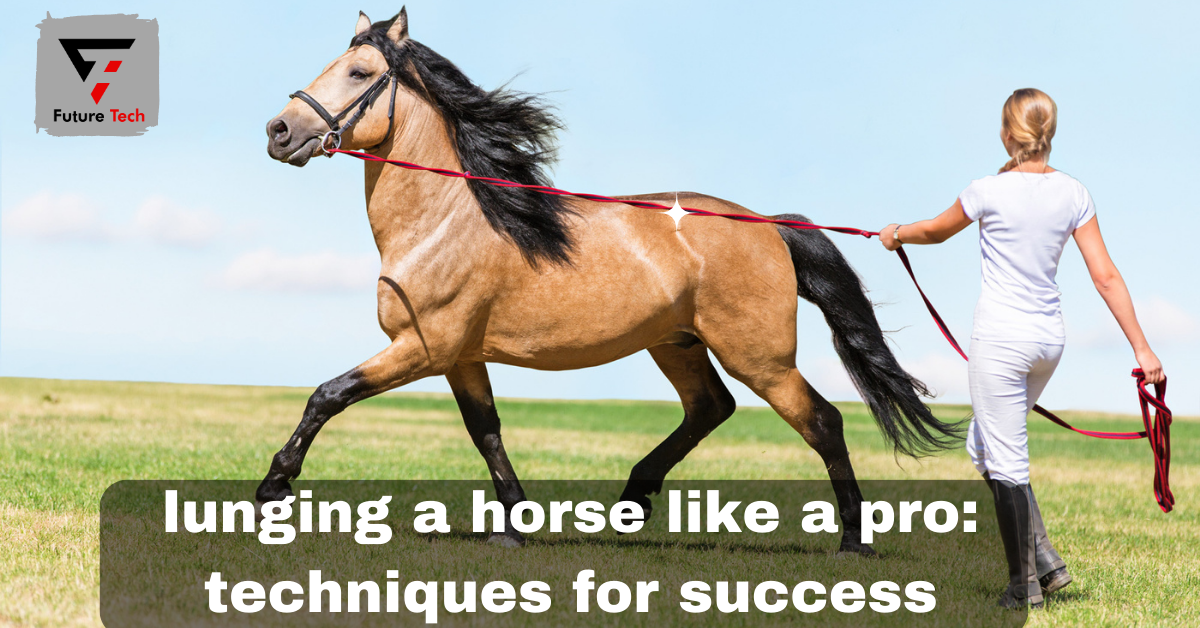1. Horse breeding farms aim to produce horses with desirable traits, such as conformation (physical structure), athleticism, temperament, and specific skills required for various disciplines. The primary goal is to improve the breed and maintain its integrity.
2. Horse breeding farms often establish well-defined breeding programs that involve selecting suitable stallions (male horses) and mares (female horses) for mating based on their pedigree, performance, and physical characteristics. The goal is to enhance positive traits while minimising undesirable ones.
3. Farms often focus on maintaining and promoting specific bloodlines that have proven successful in particular disciplines, whether racing, jumping, dressage, or other activities.
4. These farms maintain specialised facilities for housing and caring for horses, including spacious pastures, barns, stables, foaling areas, and veterinary facilities. Raising healthy foals requires providing proper nutrition, healthcare, and regular exercise.
5. horse breeding facilities use sophisticated reproductive procedures, including embryo transfer and artificial insemination, to achieve practical breeding. These methods help optimise the chances of achieving a successful pregnancy and healthy foal.
History of Horse Breeding Farms
Ancient Beginnings:
Around 4000-3500 BCE, regions such as the Eurasian steppes and the Middle East witnessed the beginning of horse domestication.
Early humans selectively bred horses for traits that would enhance their usefulness in transportation, farming, and warfare.
Classical Era:
Ancient civilisations like the Greeks, Romans, and Persians recognised the significance of selective breeding in producing solid and versatile horses.
The development of cavalry units prompted a focus on breeding traits suitable for military purposes.
Medieval and Renaissance Periods:
During the Middle Ages, the demand for various types of horses increased due to uses like ploughing, transportation, and war.
Monasteries and noble estates often carried out horse breeding practices, with monks and nobles carefully selecting horses for specific tasks.
18th and 19th Centuries:
The Enlightenment era introduced a more scientific approach to horse breeding, emphasising the understanding of genetics and inherited traits.
The rise of horse racing and equestrian sports resulted in the specialisation of breeds, such as Thoroughbreds for racing and Warmbloods for riding and carriage.
Industrial Revolution:
Advancements in transportation and mechanisation during the Industrial Revolution reduced the reliance on horses for labour.
Despite this, the demand for sport and leisure riding ensured the continued thriving of horse breeding.
20th Century:
In the 20th century, we witnessed the emergence of breed registries and breed associations dedicated to preserving and improving specific horse breeds.
Advancements in veterinary science, artificial insemination, and transportation further revolutionised horse breeding practices.
Modern Era:
Highly specialised horse breeding farms today often concentrate on specific breeds and disciplines.
Technology and genetic research have facilitated the more precise selection of breeding pairs and a better understanding of hereditary traits.
Types of Horse Breeding Farms
Thoroughbred Breeding Farms:
These farms focus on breeding Thoroughbred horses, known primarily for their speed and agility in horse racing. The goal is to produce fast and competitive racehorses, often emphasising pedigrees and performance records.
Warmblood Breeding Farms:
Horses from warmblood breeding farms are fit for various riding sports, including eventing, show jumping, and dressage. Warmbloods are renowned for their adaptability, athleticism, and disposition.
Quarter Horse Breeding Farms:
These farms specialise in breeding American Quarter Horses, renowned for their speed over short distances, versatility in Western riding disciplines, and other activities like ranch work and rodeo events.
Arabian Horse Breeding Farms:
Arabian horse breeding farms focus on the Arabian breed, known for their distinctive appearance, endurance, and historical significance. People often breed Arabians for various purposes, including showing, endurance riding, and companionship.
Standardbred Breeding Farms:
Standardbred farms focus on breeding horses for harness racing. These horses are known for their pacing and trotting abilities, and trainers use them in harness racing competitions.
Sport Horse Breeding Farms:
Sport horse breeding farms aim to produce horses suitable for various equestrian sports, including dressage, show jumping, eventing, and more. These farms often crossbreed different breeds to achieve desired traits.
Pony and Miniature Horse Breeding Farms:
These farms specialise in breeding smaller equines, including ponies and miniature horses. People often breed these animals for children’s riding, companionship, and showing.
Draught Horse Breeding Farms:
Draught horse breeding farms focus on producing heavy horse breeds, such as Clydesdales, Percherons, and Belgians. These horses are bred for farming, logging, and pulling heavy loads.
Breeding Farms for Specific Disciplines:
Some farms concentrate on producing horses for specific equestrian disciplines, like reining, cutting, polo, or endurance riding. Breeders carefully select and breed these horses to excel in their designated fields.
Crossbreeding Farms:
Crossbreeding farms aim to combine the traits of different horse breeds to create animals with unique qualities. This approach can lead to the development of new species or types tailored to specific needs.
Rare and Endangered Breeds Breeding Farms:
These farms focus on preserving and protecting rare, endangered, or historical horse breeds that may be at risk of extinction.
Breeding Farms for Color or Markings:
Some farms specialise in breeding horses for specific coat colours, markings, or patterns, such as palominos, pintos, or Appaloosas.
Horse Breeding Farm Operations
Breeding Program Design:
Breeders develop breeding programs outlining their goals, objectives, and strategies for improving specific traits in the horses they produce. This involves selecting suitable stallions and mares based on their bloodlines, conformation, performance records, and desired characteristics.
Selection of Breeding Stock:
Breeders carefully consider when choosing stallions and mares for breeding. They evaluate their pedigree, conformation, temperament, and health history to ensure optimal pairings.
Reproductive Management:
Reproductive specialists oversee the breeding process, which may involve natural mating or artificial insemination. Veterinarians monitor the reproductive cycles of the mares and use techniques like ultrasound to detect ovulation and ensure successful mating.
Pregnancy Monitoring and Foaling:
The farm closely monitors pregnant mares throughout their gestation period. As the due date approaches, the farm provides dedicated foaling areas equipped with cameras and alarms to ensure the safe delivery of foals. Veterinarians and experienced staff are available to assist if necessary.
Foal Care and Development:
The farm immediately attends to newborn foals, ensuring colostrum intake, umbilical care, and health checks. Gradual introduction to handling and socialisation helps them develop positive behaviour traits.
Healthcare and Nutrition:
Horses on the breeding farm receive regular veterinary care, vaccinations, deworming, and dental care. The farm provides proper nutrition for the overall health of mares, stallions, and foals, tailoring diets to their needs.
Training and Conditioning:
The farm initiates young horses into basic training routines, including halter breaking, leading, and positive human interactions. They ensure proper exercise and conditioning, vital for their physical development.
Horse Breeding Farms’ Challenges and Opportunities Challenges:
Maintaining Genetic Diversity:
A significant challenge involves maintaining genetic diversity within specific breeds while avoiding inbreeding. Health issues and reduced overall vigour can result from overemphasising famous bloodlines.
Ensuring Health and Welfare:
Ensuring the health and welfare of both breeding stock and foals requires consistent monitoring, effective healthcare practices, and skilled veterinary care. It is essential to prevent and manage diseases.
Achieving Reproductive Success:
Addressing fertility issues and optimising reproductive management are ongoing challenges as not all matings result in successful pregnancies, leading to financial and emotional setbacks.
Adapting to Market Fluctuations:
Adapting to changing trends and economic conditions is necessary as the equine market can be unpredictable, with changes in demand affecting horse sales.
Navigating Regulatory Compliance:
The complexity and time-consuming nature of compliance with breed association regulations, animal welfare standards, and local regulations can impact reputation and operations if unmet.
Making Ethical Decisions:
Responsible breeding requires ethical decisions about breeding practices, retirements, and the future of horses no longer needed for breeding.
Managing Costs: Substantial costs associated with maintaining and breeding horses encompass expenses for veterinary care, feed, facilities, and specialised equipment.
Opportunities:
Leveraging Technological Advancements:
Advances in reproductive technologies, genetic testing, and healthcare offer opportunities to enhance breeding outcomes, identify genetic traits, and optimise management practices.
Exploring Diversification:
Breeders can explore diversification by producing horses for multiple disciplines or developing new markets for specific traits.
Engaging in Education and Research:
Continuous learning about equine genetics, reproduction, and farming can improve breeding strategies and better horse care practices.
Promoting Sustainable Breeding:
Sustainable practices, such as protecting endangered breeds and encouraging ethical breeding, align with the public’s rising concern for environmental issues and animal welfare.
Fostering Collaborations:
Partnering with other farms, veterinarians, and equine professionals can offer access to expertise, resources, and a broader network.
Expanding Global Market Access:
The ability to expand the reach of breeding operations by connecting with buyers and markets worldwide through technology and international partnerships is an opportunity.
Identifying Niche Markets:
Creating unique selling propositions by identifying and catering to niche markets, such as therapy horses or working equines, is a potential avenue.
Showcasing Performance Records: The farm can enhance its reputation and attract potential buyers by tracking and showcasing the success of horses bred from the farm.
Summary
Horse breeding farms specialise in breeding and raising horses with specific traits and qualities. These farms are crucial in enhancing and preserving the quality of various horse breeds used for racing, show, work, and companionship. The critical components of horse breeding farms encompass distinct breeding programs, meticulous selection of breeding stock based on pedigree and characteristics, advanced reproductive management techniques, provision of designated foaling areas, and implementation of comprehensive healthcare and nutrition protocols.
These farms serve a diverse array of breeds, tailoring each one to particular disciplines and activities. While challenges, including genetic diversity, regulatory compliance, and market fluctuations, are present, opportunities arise from harnessing technological advancements, pursuing diversification, fostering education, and adopting sustainable practices. Ultimately, the triumph of horse breeding farms relies on a balance between executing effective breeding strategies, considering ethical aspects, and committing to the well-being of the raised animals.




